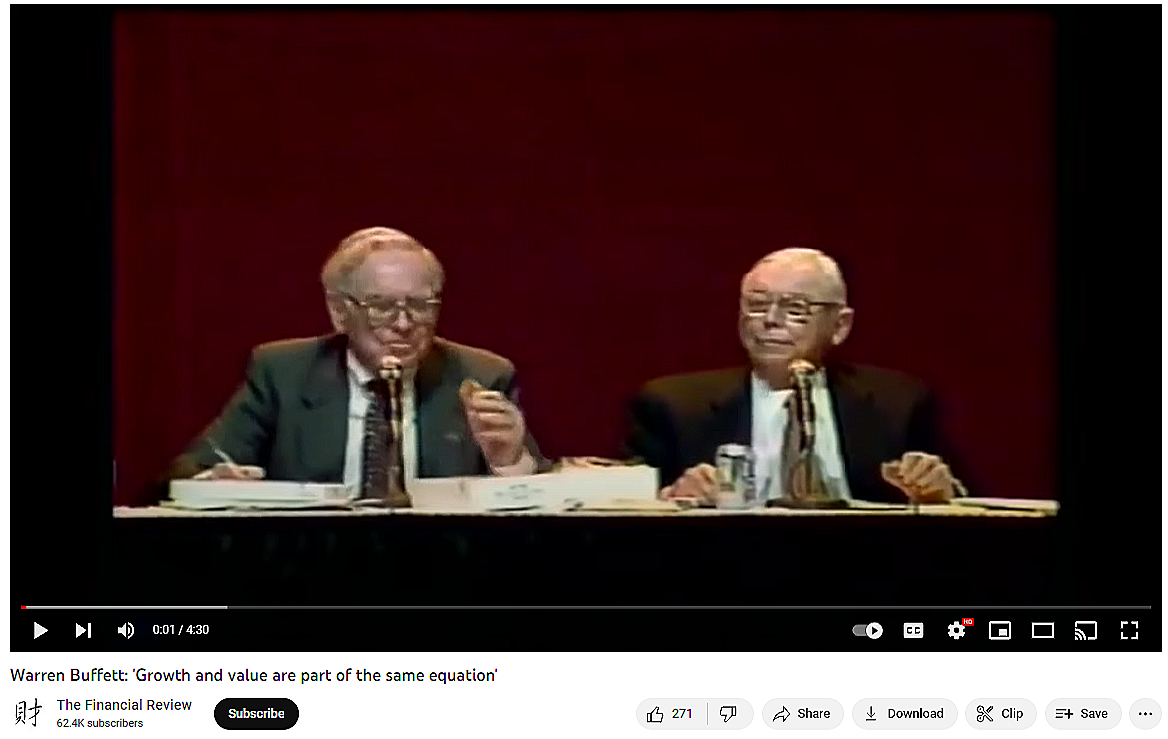If “Value Investing” Is Bad Language, What Should We Make of “Growth Investing?”
Is that redundant, too?
In the last few weeks, we thrust a dagger into the heart of “value investing.” Ben Graham, the alleged “Father of Value Investing” did not utter that phrase once in The Intelligent Investor. His infamous disciple, Warren Buffett believes the term is redundant and his long-time business partner, Charlie Munger, said it is a bad use of the language. One should heed caution, especially when this trio agrees on something related to investing.
You know our position on this - “value investing” is like the spoon in the Matrix movie, it does not exist. More precisely, all investing is value investing. The term’s popularity is good for anybody who sells speculation under the guise of investing, but bad for the public at large.
This begs the question: What should we make of the term “growth investing?” If all investing is value investing (it is), does the term “growth investing” have any use at all?
Larry Sarbit, a portfolio manager, believes it’s a hoax. First, he lays out the problem, and does that extremely well:
For as long as I can remember — and I’ve been in this business for more than 40 years — the financial community, including the academic world, has separated the world of investing into two distinct investment strategies: value investing and the growth approach. These different roads have been institutionalized to the extent that the division has gone virtually unchallenged.
Then, he wastes no time getting to the point:
In my modest view, the split between growth and value is totally arbitrary and quite frankly makes no sense whatsoever. It’s like taking a car, removing the engine and offering the chassis and engine for sale separately. If you have only one, you’re going nowhere.
Which leads to this:
The result is that growth or value investors pursue an incomplete stock selection approach. Part of the value derived in owning a business is the future growth produced by that enterprise. We look for companies able to produce increasing amounts of cash flow in the future while at the same time, paying a reasonable or value price for that asset.
Basically, he is saying that it is not value vs. growth, it’s both. It’s all about cash flows and for what price they are being bought. Remember, investing is like buying cheap apple trees.
That said, how do we know what is cheap? Warren Buffett asked the same question in his 1992 investor letter. He said:
But how, you will ask, does one decide what's "attractive"? In answering this question, most analysts feel they must choose between two approaches customarily thought to be in opposition: "value" and "growth." Indeed, many investment professionals see any mixing of the two terms as a form of intellectual cross-dressing.
Then, just before he buried value investing for good (yes, this is the same investor letter in which he told the world that the term “value investing” is redundant), he made a little confession:
We view that as fuzzy thinking (in which, it must be confessed, I myself engaged some years ago). In our opinion, the two approaches are joined at the hip: Growth is always a component in the calculation of value, constituting a variable whose importance can range from negligible to enormous and whose impact can be negative as well as positive.
When Buffett says, “in which, it must be confessed, I myself engaged some years ago,” does he refer to this 1984 article, which eventually made its way into the 1986 edition of The Intelligent Investor as an appendix, and from there, to practically the entire finance community? Only Buffett can answer that question. In any event, remember, we believe that may have been the point when finance skewed into an alternate reality.
All of this is hard to believe, isn’t it? We don’t blame you, Wall Street is very good at marketing. If you are still skeptical, we strongly recommend that you watch this video (from Berkshire Hathaway’s 2001 Annual Meeting):
This might be one of the most underrated five minutes of audio you will ever listen to. If you still consider that too long, just read this one sentence in which Warren Buffett thrusts a dagger into the heart of bad language in finance:
Anybody that tells you, you ought to put your money into growth stocks or value stocks really does not understand investing.
Ouch.
So, you do have a choice. You can take the advice of the world’s fifth richest person, who literally made his money by investing, seriously. Alternatively, you can listen to Wall Street, which isn’t necessarily thriving through investing in stocks, but by riding on ambiguous language and selling speculation as investing.




